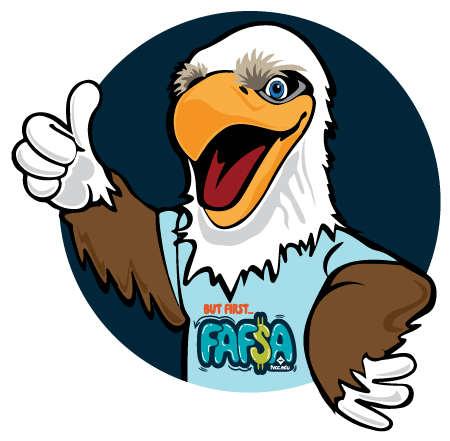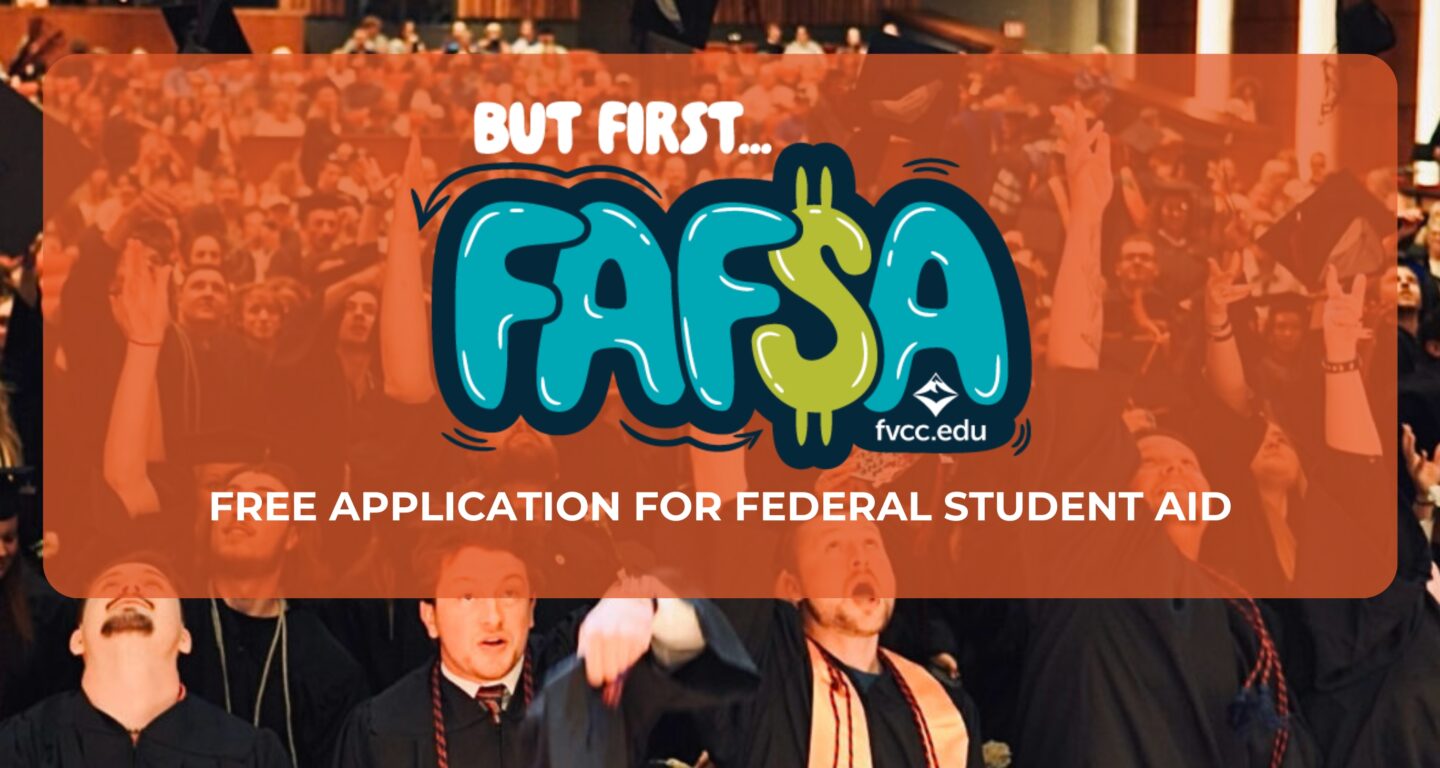HOW TO PAY FOR COLLEGE
Already applied? Check FAFSA status here.
Apply for Scholarships
Scholarships
Available
All you have to do is fill out one application to be eligible for over 850 different scholarships.
ALL ABOUT WAIVERS & DISCOUNTS
Your tuition could be completely waived!
Are you are Montana resident? FVCC provides a number of discounts and tuition waivers to qualified students who live in Montana.
FVCC Learning Communities
A SMALL COHORT OF FELLOW STUDENTS
Students that share common academic goals and work collaboratively in the classroom.
Faculty mentors work closely with advisors to support your academic journey and help you achieve your goals.
APPLY FOR FEDERAL STUDENT AID TODAY!
Have Questions?
Contact Financial Aid

We look forward to meeting you and discussing your individual financial aid needs.
Our office is located in the Learning Resource Center (LRC) 117.
Mailing Address:
FVCC Financial Aid Office
777 Grandview Dr.
Kalispell, MT 59901
FAQS about Grants, Loans, FAFSA, and more!
What is FAFSA?
Colleges and career schools use the FAFSA form to determine how much financial aid you’re eligible to receive, which could include grants, scholarships, work-study funds, and loans.
You must apply for aid every year, but with the right information in hand, it’s easy. Find more information and apply at fafsa.gov.
Types of Grants
Grants are a form of financial assistance that do not have to be repaid. Awards are limited to students who demonstrate financial need through the financial aid application process. Excluding the Pell Grant, an enrollment status of six or more credits is required to receive aid.
Federal Pell Grants
- Federally funded program
- Awarded to undergraduate students without a bachelor’s or professional degree
- Eligibility determined by a student’s Expected Family Contribution (EFC), which is calculated from the FAFSA and enrollment status
Federal Supplemental Education Opportunity Grant (FSEOG)
- Federally funded program
- Awarded to exceptionally needy undergraduate students
- Reserved for students who are eligible for Federal Pell Grant funds
Types of Loans
Loans are a form of financial assistance which requires repayment over time.
FVCC processes loans through the US Department of Education Direct Loan program. Direct loans are low-interest loans for students to help pay for the cost of education after high school. The lender is the US Department of Education rather than a bank or other financial institution.
All direct loans have a 6-month grace period. This means you will have six months from the time you graduate or stop attending school at least half-time (six credits) before you have to start making your student loan payment.
Subsidized Loans
Eligibility is based on financial need as determined from information provided on the Free Application for Federal Student Aid (FAFSA). You’ll find more information and current interest rates for federal subsidized loans at the Federal Student Aid website.
Unsubsidized Loans
Unsubsidized Direct loans are not based on financial need. Eligibility is open to any qualified student. You’ll find information and current interest rates for federal unsubsidized loans at the Federal Student Aid website.
Federal Parent Loan for Undergraduate Students (PLUS)
The PLUS loan is a loan that parents can apply for to assist with covering the cost of attendance. This loan is specifically for parents of undergraduate “dependent” students.
For more information about subsidized and unsubsidized student loans, visit studentaid.gov.
Cumulative Aggregate Loan Limits
Besides annual loan limits based on grade level, students also have cumulative loan limits. As a dependent undergraduate student the limit is $31,000 (maximum $23,000 subsidized). As an independent undergraduate student the limit is $57,500 (maximum $23,000 subsidized). For more information on loan limits, visit studentaid.gov.
Deferment/Forbearance
A deferment or forbearance is a postponement of payments for a specific period of time. Deferments are an entitlement of the Federal Student Loan Program and if you meet eligibility requirements, a deferment will be granted.
Common types of deferments are in-school deferment, unemployment deferment, and economic hardship deferment. Forbearances are granted at the discretion of the loan holder/servicer.
Interest continues to accrue during both deferments and forbearances for Unsubsidized loans. For Subsidized loans, interest continues to accrue during forbearances.
Consolidation Information
Consolidation through the Direct Student Loan Program is another repayment option, especially when a student has loans with multiple lenders.
Before consolidation, check with your current loan servicer to determine if you have any repayment benefits. Consolidation is not the best option for every student. Please evaluate this option carefully before consolidating your loans.
Loan Servicers Contact Information
FedLoan Servicing (PHEAA): 800-699-2908 | myfedloan.org
Great Lakes: 800-236-4300 | mygreatlakes.org
NelNet: 888-486-4722 | nelnet.com
Navient: 800-722-1300 | navient.com
CornerStone: 800-663-1662 | mycornerstoneloan.org
EdFinancial: 855-337-6884 | edfinancial.com
Granite State – GSMR: 855-337-6884 | gsmr.org
MOHELA: 888-866-4352 | mohela.com
OSLA Servicing: 866-264-9762 | osla.org
Cohort Default Rate
What is FVCC’s current loan default rate?
FVCC’s current cohort loan default rate for FY 2020 is 0%. The FY 2020 national cohort default rate is 0%. Read more about cohort default rates for colleges here.
Work Study
Work-study is a federal and state-subsidized program designed to promote part-time employment of students to help them avoid excessive debt while in college. As a student employee, students gain valuable work experience, develop new skills, and earn a paycheck to help meet their educational and living expenses.
- Work-study funds are awarded as part of a student’s financial aid package.
- Work-study awards are based on financial need and available funding.
- Any changes in a student’s financial aid package may result in a decrease in work-study funding.
- A work-study award does not guarantee employment.
- Students must participate in the recruitment process by applying to current student employment opportunities posted at www.fvcc.edu/jobs.
Does work-study go towards tuition?
Work-study awards are not applied towards a student’s tuition bill, nor is the amount of the award guaranteed. An award authorizes a student to participate in the program and sets a limit as to the amount of income a student can earn during the academic year.
It is the responsibility of the student to work enough hours to reach the earnings limit, and to budget wisely throughout the year to meet necessary college costs.
Who is eligible for work-study?
Eligibility for a work-study award depends on financial need as determined by the Free Application for Federal Student Aid (FAFSA). Since funds are limited, students applying by the priority filing date of March 1st and December 1st have the best opportunity to receive a work-study award.
Work-study awards are offered on a first-come, first-served basis for those students that complete the FAFSA as soon as possible. If a student is interested in work-study, they can complete our Work-study Interest Form.
